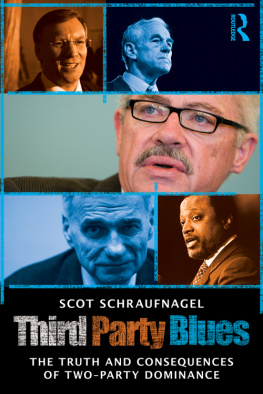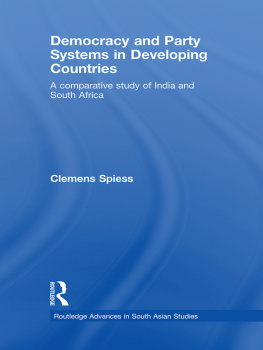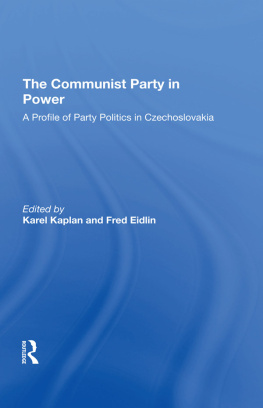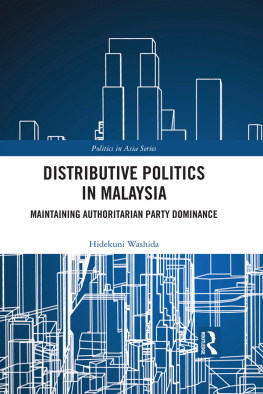Third Party Blues
More than many areas of American politics research, studies of minor party competition and success are often overly driven by normative concerns backed by little empirical scrutiny. This concise book presents a concerted effort to analyze the barriers in election law, such as ballot access restrictions and single-member districts with a plurality rule, that prevent third parties from gaining a durable hold in American politics.
Rather than trudge through yet another history of third parties in America or polemical arguments for minor party inclusion, Schraufnagel provides empirical grounding for the claims of third party backers. This thoughtful analysis demonstrates that the inclusion of third parties improves electoral participation rates and that third party involvement in the legislative process is linked to landmark legislative productivity. In the end, the work provides thoughtful suggestions on the types of reforms that would lead to greater third party success in American elections.
Scot Schraufnagel is an Assistant Professor in the Department of Political Science at Northern Illinois University. His research and teaching focuses on political parties, elections, and legislatures in the United States, with an emphasis on promoting a civil, representative, and effective governing process. Schraufnagel has been recognized for teaching excellence and has been published in a number of leading political science journals.
Controversies in Electoral Democracy and Representation
Matthew J. Streb, Series Editor
The Routledge series Controversies in Electoral Democracy and Representation presents cutting edge scholarship and innovative thinking on a broad range of issues relating to democratic practice and theory. An electoral democracy, to be effective, must show a strong relationship between representation and a fair open election process. Designed to foster debate and challenge assumptions about how elections and democratic representation should work, titles in the series present a strong but fair argument on topics related to elections, voting behavior, party and media involvement, representation, and democratic theory.
Titles in the series:
Rethinking American Electoral Democracy
Matthew J. Streb
Redistricting and Representation
Why Competitive Elections are Bad for America
Thomas L. Brunell
Fault Lines
Why the Republicans Lost Congress
Edited by Jeffery J. Mondak and Dona-Gene Mitchell
In Defense of Judicial Elections
Chris W. Bonneau and Melinda Gann Hall
Congressional Representation and Constituents
The Case for Increasing the U.S. House of Representatives
Brian Frederick
The Imperfect Primary
Oddities, Biases, and Strengths of U.S. Presidential Nomination Politics
Barbara Norrander
Rethinking American Electoral Democracy, 2nd Edition
Matthew J. Streb
Third Party Blues
The Truth and Consequences of Two-Party Dominance
Scot Schraufnagel
Forthcoming:
Helping America Vote
The Limits of Election Reform
Martha E. Kropf and David C. Kimball
In Defense of Politicians
Stephen K. Medvic
Third Party Blues
The Truth and Consequences of Two-Party Dominance
Scot Schraufnagel
First published 2011
by Routledge
711 Third Avenue, New York, NY 10017
Simultaneously published in the UK
by Routledge
2 Park Square, Milton Park, Abingdon, Oxon OX14 4RN
Routledge is an imprint of the Taylor & Francis Group, an informa business
2011 Taylor & Francis
The right of Scot Schraufnagel to be identified as author of this work has been asserted by him in accordance with sections 77 and 78 of the Copyright, Designs and Patents Act 1988.
All rights reserved. No part of this book may be reprinted or reproduced or utilized in any form or by any electronic, mechanical, or other means, now known or hereafter invented, including photocopying and recording, or in any information storage or retrieval system, without permission in writing from the publishers.
Trademark notice: Product or corporate names may be trademarks or registered trademarks, and are used only for identification and explanation without intent to infringe.
Library of Congress Cataloging-in-Publication Data
Schraufnagel, Scot.
Third party blues : the truth and consequences of two party dominance / Scot Schraufnagel.
p. cm.(Controversies in electoral democracy and representation)
1. Political partiesUnited States. 2. Third parties (United States politics) 3. Opposition (Political science)United States. 4. Political participationUnited States. 5. United StatesPolitics and government1989I. Title.
JK2261.S36 2011
324.273dc22
2010043738
ISBN: 9780415881586 (hbk)
ISBN: 9780415881593 (pbk)
ISBN: 9780203847800 (ebk)
To my wife who put up with me going back to school twice in the first ten years of our marriage and our two lovely daughters, Hillary and Autumn.
Contents
Figures
Tables
Preface
I was born in 1959 and socialized to support the Republican Party by my business-owner father. But, my maternal grandfather was a pro-union Democrat. I recall my father defending Richard Nixon, but I also remember his younger brother saying good things about John F. Kennedy and I was confused. As a young boy of about six, I got out the encyclopedia one day and tried to show my Democrat grandfather that all of the famous presidents had been Republican. The encyclopedia listed Thomas Jefferson as a Republican and neither grandpa nor I knew that this was not the same Republican Party in existence in the 1960s. I continued supporting the Republican Party up through most of Watergate in the early 1970s. Those of you that can remember know it became very difficult to be a vocal supporter of Richard Nixon in 197374. Yet I was. I remember arguing with classmates about the virtues of President Nixon and biting my pillow at night screaming in my headburn the tapes, burn the tapes! A reference to the tape recordings that were found to exist and likely contained information that would find Nixon culpable of high crimes and misdemeanors, grounds for impeachment.
As an 18-year-old college freshman in 1977 I was convinced that we needed a third party in American politics. Jimmy Carter was president and he was advocating for a Selective Service System (SSS) that would require 1826 year olds to register with the national government so that information could be maintained on those potentially eligible for military conscription. Vietnam was very fresh in my mind and I had begun to view military violence with a great deal of suspicion. I vaguely sensed the crippled Republican Party (post-Watergate) would not do much to stop the Carter initiative from becoming reality. So I joined the Revolutionary Communist Youth Brigade (RCYB), which was planning to demonstrate against the selective service program. The RCYB rhetoric also entailed the overthrow of the national government, which seemed a bit harsh to me, but at least they expressed a fresh point of view and I liked that. When the police showed up at a RCYB rally at Kent State, which was intended as a protest against the planned construction of a gymnasium on the site where students had lost their lives five years earlier, I broke from the formation of RCYB supporters and decided this kind of violence was not for me either. Further disillusionment ensued. I quit the RCYB and decided to try to forget about politics for awhile.












